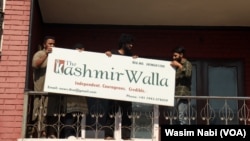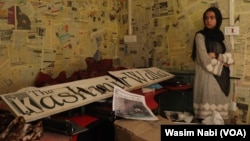Authorities in Indian-controlled Kashmir have blocked access to the website and social media accounts of the independent media outlet The Kashmir Walla.
As well as the block on accessing the web page from inside India, which was implemented Saturday, the news website’s team was issued an eviction notice for the outlet’s Srinagar office.
The measures add to the challenges for the Kashmiri media operation, whose founder Fahad Shah has been held in police custody since February 2022 on accusations of anti-state activities.
A statement that journalists from The Kashmir Walla shared via their own social media accounts said that the website’s service provider had informed them that India’s Ministry of Electronics and Information Technology had blocked the site, under the IT Act 2000.
The legislation covers issues related to cybercrime and electronic commerce.
As well as the block on their news website, the paper’s Facebook page, which had around half a million followers, and its X, formerly Twitter, account were inaccessible inside the country in response to a legal demand, The Kashmir Walla said.
When VOA checked the news website Monday, it could be viewed from the U.S. When accessed from Kashmir, however, a message appeared saying that the “address could not be found."
On Monday, the website’s staff started to clear the office in the Rajbagh area of Srinagar, in preparation to return the keys to the landlord.
Staff members had few words for the gathered media, referring journalists instead to their statement, which said that for the past 18 months they had “lived a horrifying nightmare.”
The media outlet was founded in 2011 by Shah. But since his arrest, the paper has reduced its workforce from 16 to six. Those remaining, the statement said, work in “an already inhospitable climate for journalism in the region.”
“We are not aware of the specifics of why our website has been blocked in India; why our Facebook page has been removed; and why our Twitter account has been withheld,” The Kashmir Walla said.
The statement added that the journalists have not received any notice or official order explaining the moves.
VOA emailed the information ministry and regional administration for comment and more information, but as of publication had not received a reply.
Describing the latest moves as a “new low for press freedom,” Beh Lih Yi, the Asia program coordinator of the Committee to Protect Journalists told VOA, “The censorship is not only arbitrary but also shrouded in secrecy.”
“If the Indian government wants to be taken seriously as a beacon of democracy, it must promptly restore access to The Kashmir Walla's website and social media accounts,” she said.
Analysts, journalists and some lawmakers have condemned the move.
DIGIPUB News India Foundation, a digital platform that represents online media, said that the move reflects a “pattern of arbitrary misuse of the law.”
The organization noted that conditions for media have become harder since India revoked Kashmir’s autonomy in 2019.
The past four years “have had a chilling effect on journalists, journalism, and the fundamental right to free speech,” the statement read, noting that journalists in the region risk arbitrary detention and arrest “under stringent laws relating to terrorism and national security.”
The region for decades has experienced tensions and clashes, and journalists often find themselves trapped between authorities fighting unrest, and separatists, with both sides accusing media of acting in the interest of the other.
Lawmakers including Mahua Moitra, a parliamentarian from West Bengal for the All India Trinamool Congress, and Salman Anees Soz, a Kashmiri author and a member of the Indian National Congress, both responded to The Kashmir Walla block on social media.
Moitra described it as “Yet another shameful act of censorship & muffling of Kashmiri voices,” and Soz said that the actions against The Kashmir Walla, including the jailing of its founder, sends a message to all India that “what happens in Kashmir, eventually happens elsewhere.”
Mehbooba Mufti, the last chief minister of Jammu and Kashmir and president of the Jammu and Kashmir Peoples Democratic Party, said that the media outlet was one of the few in the region left that “dared to speak truth to power.”
The news website’s staff members said in their statement that the outlet had “strived to remain an independent, credible, and courageous voice of the region.”
The statement added, “As to what the future holds, we are still processing the ongoing events.”








